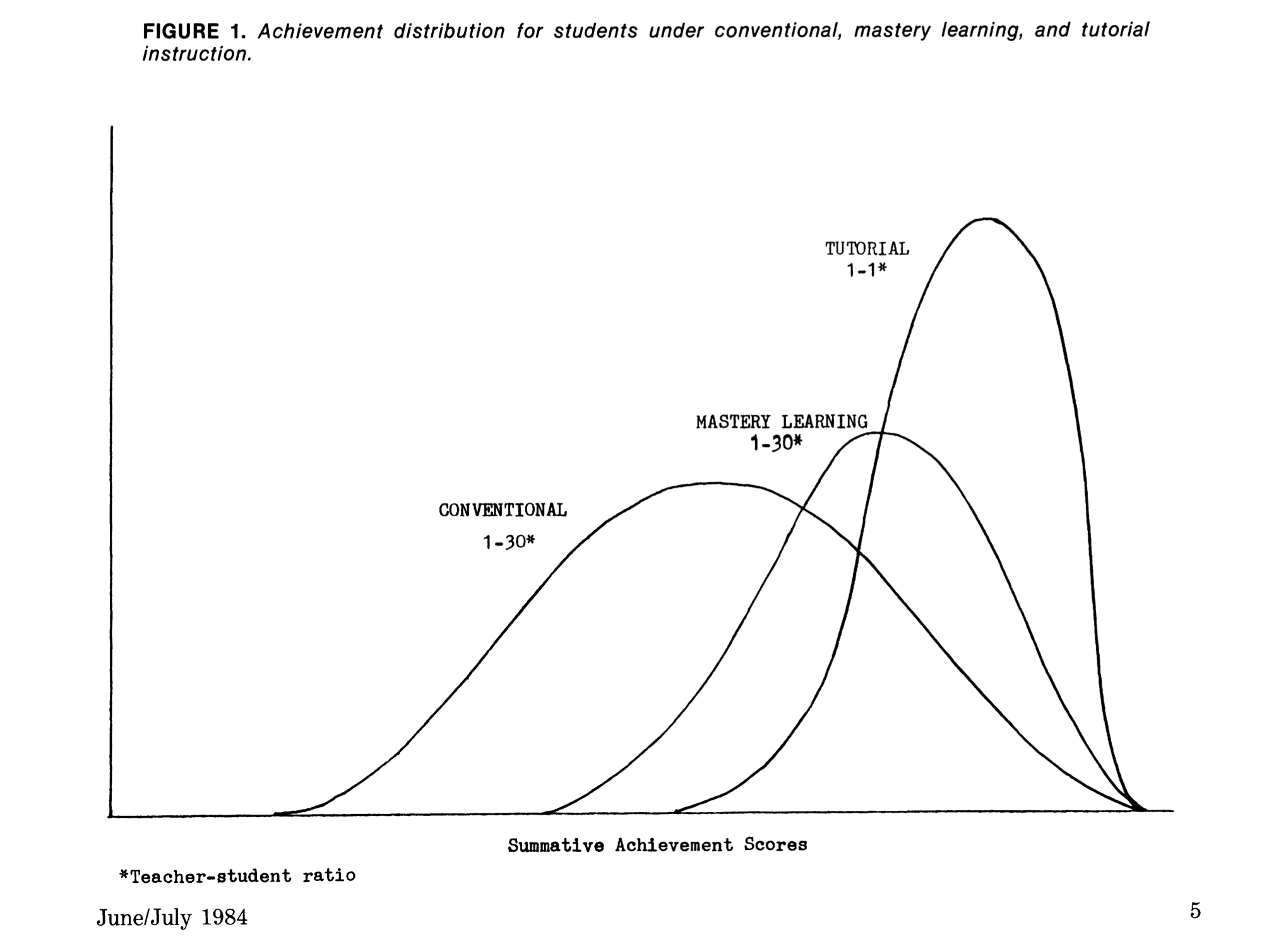One size
does not
fit all.
does not
fit all.
Created by Monster Mandarin.
Mastery Learning
When it comes to learning, indeed, one size does not fit all. If you can think back to when you were in school, you'll likely recall either with fond memories or not-so-fond memories that sometimes school was a breeze, while other times it was more than bit of a challenge.

This is because our school system and curriculums taught expect students to absorb, internalize, and synthesize the content taught at the same rate. Unfortunately, humans are not all exact replicas of each other. This means that we each learn at different rates. Conversely one might assume that that learning rate variations exist and are small enough such that a little extra homework or office hours here and there might suffice to level the playing field. However, there is data to the contrary in Bloom's 2 sigma problem. [0]
Mastery learning (or, as it was initially called, "learning for mastery") is an instructional strategy and educational philosophy, first formally proposed by Benjamin Bloom in 1968. Mastery learning maintains that students must achieve a level of mastery (e.g., 90% on a knowledge test) in prerequisite knowledge before moving forward to learn subsequent information. If a student does not achieve mastery on the test, they are given additional support in learning and reviewing the information and then tested again. This cycle continues until the learner accomplishes mastery, and they may then move on to the next stage. [1]
When it comes to learning, indeed, one size does not fit all. If you can think back to when you were in school, you'll likely recall either with fond memories or not-so-fond memories that sometimes school was a breeze, while other times it was more than bit of a challenge.
This is because our school system and curriculums taught expect students to absorb, internalize, and synthesize the content taught at the same rate. Unfortunately, humans are not all exact replicas of each other. This means that we each learn at different rates. Conversely one might assume that that learning rate variations exist and are small enough such that a little extra homework or office hours here and there might suffice to level the playing field. However, there is data to the contrary in Bloom's 2 sigma problem.
From Bloom's data, we can see that 2 sigma or 2 standard deviations of delta between conventional teaching and mastery learning techniques when it comes to achievement scores. [0]
This is because our school system and curriculums taught expect students to absorb, internalize, and synthesize the content taught at the same rate. Unfortunately, humans are not all exact replicas of each other. This means that we each learn at different rates. Conversely one might assume that that learning rate variations exist and are small enough such that a little extra homework or office hours here and there might suffice to level the playing field. However, there is data to the contrary in Bloom's 2 sigma problem.
From Bloom's data, we can see that 2 sigma or 2 standard deviations of delta between conventional teaching and mastery learning techniques when it comes to achievement scores. [0]

Furthermore when Khan Academy took a look at over 300 studies over decades into the effectiveness of mastery learning, what they found was non-trivial evidence of positive learning outcomes for students. Additionally Khan Academy reviews the effect size, a standard metric utilized for meta-analysis for which we can see the results below.
As anyone who is intimately involved in education knows, it is difficult for any single program to make a large impact on achievement. So, even numbers that seem fairly small are a relatively big impact for education interventions. We recommend the following rules of thumb for judging effect size, based on an analysis by Matthew Kraft, a professor at Brown University: [2]
0−0.05: small
0.05-0.20: medium
0.20−0.50: large
0.5−0.9: very large
> 0.9: be skeptical
To give some context, raising student achievement by 0.20 is equivalent to approximately one fourth of the Black-White achievement gap (Bloom, Hill, Black, & Lipsey, 2008), and results in a 2 percent increase in annual lifetime earnings on average (Chetty, Friedman, & Rockoff, 2014).
To summarize, Khan Academy states the following in their article title "Is mastery learning an effective approach?":
Overall, we can say across more than 300 studies and 9000 students, a mastery learning approach has a large impact on achievement of targeted objectives when used in a classroom setting and assessment is made.
Mastery Learning @ MM
Here at Monster Mandarin we practice mastery learning. Not because a bunch of scientists said it works, but because it just makes sense. Why would a teacher move on to the next topic if their student has failed to grasp the concept of the current topic? They shouldn't. And we don't.
In order to effectively use building blocks on which to build more and more knowledge, one must actually have building blocks ingrained into one's memory. This means not only caring about high quality teachers and curriculums, but also knowledge retention, recall, and real world usage.
What does this all mean? It means that at Monster Mandarin we won't move on to harder and more complex vocabulary, grammar, and situational learning topics unless our students truly understand what they've been taught. And this means they have actually learned.
It sounds simple in practice, but it is the consistent execution and and understanding of mastery learning's underpinnings and goals that make it a successful learning model at Monster Mandarin.
In order to effectively use building blocks on which to build more and more knowledge, one must actually have building blocks ingrained into one's memory. This means not only caring about high quality teachers and curriculums, but also knowledge retention, recall, and real world usage.
What does this all mean? It means that at Monster Mandarin we won't move on to harder and more complex vocabulary, grammar, and situational learning topics unless our students truly understand what they've been taught. And this means they have actually learned.
It sounds simple in practice, but it is the consistent execution and and understanding of mastery learning's underpinnings and goals that make it a successful learning model at Monster Mandarin.

Continuous Assessment
Continuous assessment means just that. We will take stock of where our students are, regularly and consistently. Not only does this process help with ascertaining what knowledge has been retained and understood, but also provides invaluable insight for our teachers about their students.
- What's working? What's not working?
- Is the teaching style a good fit for this student?
- Could the reinforcement process be better?
None of this would matter if it didn't actually help kids learn Mandarin. The good news is that we can see qualitatively that mastery learning helps students actually learn Mandarin Chinese better and faster than students who follow a fixed, one-size-fits-all curriculum and lesson plan schedule.
Students are able to retain and recall learnings faster and more consistently. And at the end of the day, that's pretty much what we're striving for.
We're a highly motivated group of individuals, so we're not going to stop here. We will continue to improve our teaching process over time with your help. Feedback from parents and students is critical to continued improvement of Monster Mandarin, so don't stop talking to us -- good or bad.
Feel free to reach out to us at hello@monstermandarin.com any time with questions, concerns, or just to say hi.
Students are able to retain and recall learnings faster and more consistently. And at the end of the day, that's pretty much what we're striving for.
We're a highly motivated group of individuals, so we're not going to stop here. We will continue to improve our teaching process over time with your help. Feedback from parents and students is critical to continued improvement of Monster Mandarin, so don't stop talking to us -- good or bad.
Feel free to reach out to us at hello@monstermandarin.com any time with questions, concerns, or just to say hi.
References
[0] http://web.mit.edu/5.95/readings/bloom-two-sigma.pdf
[1] https://en.wikipedia.org/wiki/Mastery_learning
[2] https://www.khanacademy.org/khan-for-educators/k4e-us-demo/xb78db74671c953a7:khan-for-educators/xb78db74671c953a7:introduction-to-mastery-learning/a/is-mastery-learning-an-effective-approach
[1] https://en.wikipedia.org/wiki/Mastery_learning
[2] https://www.khanacademy.org/khan-for-educators/k4e-us-demo/xb78db74671c953a7:khan-for-educators/xb78db74671c953a7:introduction-to-mastery-learning/a/is-mastery-learning-an-effective-approach